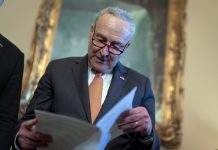ALBANY, N.Y. (AP) — New York Gov. Kathy Hochul on Monday announced the framework of a $237 billion budget that includes broad plans to drive new housing construction, address the influx of migrants and crack down on illegal marijuana shops.
Hochul, a Democrat, described the announcement as the “parameters of a conceptual agreement” on the budget, which is about two weeks late, that was struck with leaders of the state Senate and Assembly after a series of backroom negotiations.
“You can’t get to the legislature for consideration unless we have agreement on the package to go forth,” Hochul told reporters at the Capitol, adding, “It takes a little time to get to the final resolution but I’ve explained what I feel there’s agreement on.”
Still, the governor’s announcement appeared to have caught lawmakers off guard, with officials still in the process of holding meetings and working out the specifics of the spending plan.
“I think it was a surprise for all of us in the Senate,” said state Sen. Liz Krueger, a high-ranking Democrat.
The Senate and Assembly, both controlled by Democrats, would need to approve the budget before it could become law.
The housing deal outlined by Hochul would include a new tax break for developers to incentivize building and a set of tenant protections to make it harder to raise rents and evict people in certain cases, though specifics were not detailed. It also includes plans to use commercial properties and state lands for residential housing.
The sweeping housing agreement had become a sticking point in negotiations, with top officials moving to craft a deal that leads to more new, affordable homes while protecting tenants and luring developers to build.
The spending plan would also set aside $2.4 billion for the state to address numerous migrants who have overwhelmed New York City’s homeless shelters, following a proposal from Hochul to provide short-term shelter services, legal assistance and more.
And Hochul said there was an agreement on a new strategy to combat unlicensed marijuana storefronts, which have become ubiquitous in the city following the state’s legalization of recreational weed sales, through a proposal to make it easier for local authorities to close the black market shops.
Source: post





